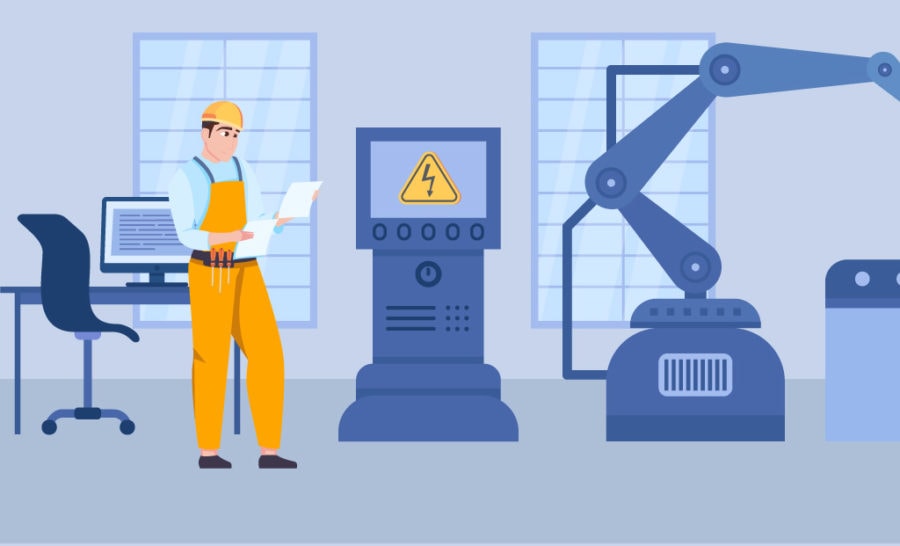The word ‘downtime’ is not an uncommon word on the manufacturing shop floor. But, the very mention of it is enough to send shop floor managers and supervisors scrambling to resolve it as early as they can. They know that any unplanned downtime during peak operating hours will disrupt production, leading to delivery delays, loss of precious man-hours, and money.
The entire manufacturing industry has been striving hard to find an answer to unplanned production downtime. Yes, there has been technological progress, both in the field of manufacturing and manufacturing software, that prevents and reduces downtime to a great extent. But the unpredictability of it becomes a big challenge for manufacturers.
What causes manufacturing downtime?
There are two types of manufacturing downtime, planned and unplanned.
Planned downtimes are scheduled owing to regular maintenance of assembly lines, machines, parts, or the entire facility, etc.
Unplanned downtimes are caused due to,
- Machine breakdowns owing to improper maintenance, sub-standard/over-used parts, overload, or operator errors
- Inventory shortage due to supply chain & warehousing issues leading to production delays
- Operator errors due to improper training, communication, deviation from SOPs, etc.
- Improper demand forecast and production scheduling
- Lack of collaboration & communication between departments
- Lack of automation for sales and work order management
Impact of manufacturing downtime
- Production & revenue loss
- Order pileup and delays
- Loss of Capacity and resource utilization
- Increase in maintenance and repair costs
- Dip in customer satisfaction and market reputation
How ERP helps keep manufacturing downtime in check?
ERP software, with its advanced functionalities and integration capabilities, can help manufacturers to prevent and reduce production downtime to a great extent. Let us glance through a few.
Machine Monitoring
Machine monitoring capability is a pivotal feature for manufacturers with which they can monitor machines in real-time and get continuous data about their daily performance. It can easily be integrated with ERP software to get a comprehensive analysis of shop floor performance and efficiency.
Shop floor managers can constantly monitor production via ERP and get details such as machine setup time, machine uptime, scrap generated, job cycle time, personnel login/logout time, machine idle time, material utilization per job, overall yield, etc.
They can also track critical machine parameters enabling them to predict downtime even before it occurs. They can take corrective measures to arrest any deviations before it goes out of control and impact production.
If there is an instance of machine downtime, it is immediately attended to and the concerned job is re-directed to another machine based on availability.
The real-time monitoring of machines and constant data flow enables the manufacturer to arrive at accurate and dynamic scheduling of production. Personnel knows the jobs that are running smoothly and will be completed on time, jobs that have run into issues for relevant reasons. Scrap data generated from the machines help arrive at material utilization, wastage, and overall quality of products.
Machine Data Analytics
ERP’s centralized database allows users to store, retrieve and update data. With its integration with Machine Monitoring systems, an ERP can collect & store machine data in real-time.
Manufacturers can analyze this data and predict what component might break down at what precise day/time. This helps them change machine parts before they break down, thereby preventing downtime; reducing repair and production delays costs. This also increases machine uptime leading to increased production time and efficiency.
Real-time Supply Chain & Inventory Visibility
Downtimes can also occur if the manufacturer doesn’t have adequate inventory in hand leading to a production delay. Inventory shortages can occur due to inadequate visibility into the supply chain and inventory movement, inventory mismanagement, warehouse inefficiencies, etc.
With ERP’s inventory management capability, manufacturers can keep a ready inventory count at all times, from its procurement to consumption.
ERP’s integration with bar code technology enables personnel to instantly record vital product information into the ERP from anywhere. This ensures that manufacturers have a ready count of how much materials they have in hand, enabling them to schedule jobs, and accurately arrive at job costs easily.
With advanced warehouse management features, manufacturers can track goods movement, streamline inventory counting, improve bin efficiency and ensure easy access to inventory.
Auto inventory reorders prevent stockouts of parts and raw materials, thereby making job scheduling and production more efficient and cost-effective. All of these ensure that production isn’t delayed due to inventory shortages.
Conclusion
Unplanned manufacturing downtime affects the entire supply chain, from vendors to customers to manufacturers themselves. The cost of downtimes is very high and the market is too competitive to bear such a loss.
By detecting potential defects in machine equipment/assets and prompting immediate rectification, manufacturers can ensure zero damage to critical human life and the production environment.
OmegaCube ERP can be integrated with various leading third-party systems for machine monitoring, bar-code, shipping, etc. This integration paves way for manufacturers to automate their workflows and reduce unplanned downtimes to a great extent.
Contact us for an in-depth demo!




